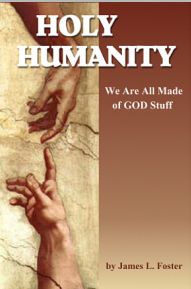 |
Finding Love in your life can help lead you toward inner peace. James L. Foster's book, HOLY HUMANITY - We Are All Made of GOD Stuff has interesting understandings about Faith and Agápe Love and what it is. His book talks about faith in general and answers the questions, "Can we reconcile our faith in light of current understandings of science and the possibilities of studying other faiths and cultures today? Does faith allow for new insights? Is our faith an ongoing journey? Dare we love God and our neighbors while incorporating new understandings?" Holy Humanity answers all these questions with an unequivocal, Yes! Below is a part of Chapter 3, reproduced with permission. |
|
What Is God’s Dream? by James L. Foster, Another one of God’s dreams was reported in another piece of inspired writing by the mystic and apostle, Paul. Though Paul does not present this as a dream or vision, I believe it is, in fact, God’s vision given through Paul. He speaks of love (specifically of agápe), as a gift of God, Godly love, recorded in his first letter to the Corinthian church as follows (edited by this author to indicate the use of agápe in original Greek): “If I speak in the tongues of men and of angels, but have not agápe, I am a noisy gong or a clanging cymbal. And if I have prophetic powers, and understand all mysteries and all knowledge, and if I have all faith, so as to remove mountains, but have not love, I am nothing. If I give away all I have, and if I deliver my body to be burned, but do not have love, I gain nothing... “Agápe never ends. But where there are prophecies, they will pass away; as for tongues, they will cease; as for knowledge, it will pass away. For our knowledge is imperfect and our prophecy is imperfect, but when the perfect comes, the imperfect will pass away. When I was a child, I spoke like a child, I thought like a child, I reasoned like a child; when I became a man, I gave up childish ways. For now we see in a mirror dimly, but then face to face. Now I know in part; then I will understand fully, even as I have been fully understood. So faith, hope, agápe abide, these three; but the greatest of these is agápe.” (I Corinthians 13:1-3, & 8-13 KJV, adapted) Perhaps the most misunderstood term in the Christian vocabulary is “love”. In addition to, or instead of its biblical usages, love has acquired in our secular societies other baggage which confuses, and usually contradicts, the biblical meanings and standards. The following comparisons of the secular and biblical usages will illustrate the differences.
A Brief Word Study on agápe, eros, and phileo The English word “love” has its root in the Indo-European leubh and its archaic English progeny, lief. Its root meaning is “to find pleasing” plus the Old English derivative meanings, “affectionate” and “lovable”. Thus, the English word “love” does convey some of its root meanings in secular usage. The problem arises when it is used to translate not one, but all three Greek terms for love. The only one of the three Greek words, translated in English as “love” for which it is an adequate translation, is the Greek term eros (erotic or sexual love). The other two Greek terms which we translate “love” are agápe (Godly love) and phileo (brotherly love). Agápe is the predominant word for “love” in the New Testament (used 221 times), and it specifically refers to that self-sacrificing, unconditional love characteristic of God’s way of relating to us. Phileo (used thirty-one times) is found particularly in the Gospel of John, as in God’s love for his son (John 5:20), and of Jesus’ love for Lazarus as in “Behold how he loved him!” (John 11:36). Eros, sexual love is not found in the New Testament at all, but agapáo the verb form of agápe, is used in place of eros which has no verb form. In Ephesians 5:25 and 28, agapáo is used specifically of the physical union of husband and wife and, analogously of the union of Christ and the Church. The image of the bride and the bridegroom in Revelation 19:7-9 likewise speaks of the sexual dimension of Divine Love. Thus, it is my conclusion that “agápe” in the New Testament speaks not so much of form as it does quality. Agápe predominates precisely because God’s Love for us and through us is of a deeper, more intense quality than that found in other human relationships. Agápe has no form of its own but is dependent on the forms of phileo and eros for its expression. But the intensity of that expression, when it is agápe being expressed, is as different from the forms it uses as is light from darkness. How tragic our loss, and how impoverishing, when we settle for the secular definition of love; on the other hand, how immeasurable is the gift of agápe when we allow God to love others through us! How rich are our lives and how enriched are the lives of those we love! Want to read more? Download the entire book here, with permission, for free. "Holy Humanity - We are all made of GOD Stuff"
|